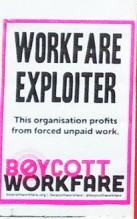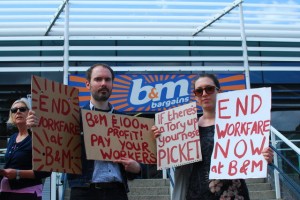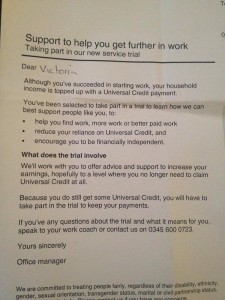Posted: August 20th, 2016 | Author: againstworkfare | Filed under: Guest blog, Info on schemes | No Comments »
 This post, which sets out the numerous problems with the DWP’s extensive use of electronic forms (eforms), first appeared on the blog dwpcomms, and is reposted here with permission.
This post, which sets out the numerous problems with the DWP’s extensive use of electronic forms (eforms), first appeared on the blog dwpcomms, and is reposted here with permission.
A key feature of the DWP’s ambitious digitisation initiative is to shift all responsibility for entering data onto the claimant. Electronic forms (eforms) are the DWP’s method of choice. Take Universal Credit, which is designed to be claimed online. Under Universal-Credit claimants have no choice but to claim through eforms. However, there are several reasons why eforms are unsafe and inappropriate.
Accuracy
Eforms limit the reality that they’re trying to capture to what the eform designer was able to think of and allowed to include. And eforms are usually just questionnaires with closed questions. However, reality and people’s circumstances are usually more complex. Eforms will generate an inaccurate and misconstrued representation of reality.
Storage of Context
A related issue with eforms is, that the way the collected information is stored and presented in the system, can be different from the context in which the information was given. This context is not accessible to the person submitting information (submitter). And the submitter cannot check or correct the appropriateness of the context with which the information is stored. On the other hand, when somebody submits a free text statement (i.e. when they’re able to write or type whatever they want in response to the question), that statement would usually have to be retained as a whole and would preserve the context.
Read the rest of this entry »
Posted: August 9th, 2016 | Author: boycottworkfare | Filed under: Charities, Guest blog, Name and shame, Personal accounts, Sanctions | Tags: Benefit sanctions, Community Work Programme, Samaritans | 3 Comments »
Though the Samaritans don’t appear on the recently released lists of workfare exploiters from 2012, we’ve had a report of a Mandatory Work Activity placement in their shop in Hove in 2014. Recently, a claimant has also contacted us about Community Work Placements at another Samaritans charity shop in May 2016. Our correspondent writes: “I would like to point out that, even though I wasn’t placed at the Samaritans, other people sent by Interserve were.”
Like some other claimants who told the truth when questioned about health considerations during an interview and were not taken on, this individual has been sanctioned.
So a claimant who replies honestly about a health condition is alleged to be ‘negative’? Given that the upcoming Work & Health Programme targets claimants with disabilities and long-term health issues, we’ll greet this with a shudder and then get very, very angry.

This doesn’t seem to apply to claimants conscripted to work for free in Samaritans shops
Sanctioned by the Samaritans
I was sent for a CWP placement interview at a Samaritans charity shop. Due to my health issues, the store manager decided that I wasn’t suitable. On returning to Interserve I was removed from the CWP program and ended up with a four-week sanction.
I complained and tried to appeal but the provider Interserve and later the Jobcentre claimed that I had been very negative during the interview and refused to do the placement. This was a lie! The store manager had asked me early in the interview if I had health problems and I had only told her the truth. Read the rest of this entry »
Posted: August 7th, 2016 | Author: boycottworkfare | Filed under: Call to action, Charities, Pledge to boycott workfare | No Comments »
Workfare hasn’t gone away (as evidenced by the number of name & shame posts we still get). But the recent press coverage of the court ruling revealing workfare exploiters is an opportunity to ask some tough questions of charities that may still be involved with workfare. We would like to encourage people to contact charities on that list to find out whether they are currently using workfare, and their position on workfare.
First check at KVV to see whether they have since signed the agreement not to use workfare.
Here is a sample letter which you can use – modify it as you wish.
Posted: July 31st, 2016 | Author: againstworkfare | Filed under: Guest blog, Law, Name and shame | 2 Comments »
This is the second of two linked posts about the DWP’s release of the names of organisations that were using Mandatory Work Activity in 2011-12. The first post – a response from Boycott Workfare – is here. This blog is a guest post by Frank Zola, a member of Boycott Workfare who has been involved since the start in the battle to get the DWP to reveal the names of workfare exploiters through Freedom of Information requests. You can also read the post on his blog here. Frank Zola was previously sanctioned as a flexible new deal (“work for your benefit“) workfare refusenik and A4e conscript.
“READ THIS AND RAGE AGAINST THE SYSTEM!”
— Clare Hepworth OBE (@Hepworthclare) July 31, 2016
 1. Report on Court of Appeal ruling
1. Report on Court of Appeal ruling
2. Background resources, FOI requests, Media reporting, ICO decisions, Tribunals and Court of Appeal rulings
3. Names of the 534 shameful workfare exploiters (employers)
“In a battle with the information commissioner, the DWP has said that the government’s mandatory work programme would “collapse” if the names were made public due to the likelihood of protests against the organisations involved.”
Guardian – 9th November 2012
1. Report on Court of Appeal ruling
(Joint update with Boycott Workfare)
Battle royal
After a 4 and half year battle, on Wednesday July 27th 2016 the DWP was forced by a Court of Appeal (CofA) ruling to capitulate and release the names of more than 500 – Mandatory Work Activity workfare exploiters.
A matter of judgement and public interest
This decision was reached by three judges on a 2 to 1 basis, citing public interestconsiderations being “firmly” viewed by the first tier tribunal (FTT) as “appreciably” outweighing the commercial interests of the workfare placement hosting employers not to be named and be subject to protests. The FTT ruling(pdf) dealt with three conjoined appeals (Zola, Naysmith and Kelly), as all requested names of workfare exploiters.
“The tribunal is firmly of the view that in these appeals the scales are weighed appreciably in favour of disclosure”
A precedent
This legal precedent should now mean anyone, anywhere in the world, is free to use the Freedom of Information Act (2000) (FOIA) to request the names of UK workfare exploiting employers. I suggest using whatdotheyknow.com to make such FOIA requests, as it ensures the FOIA process is kept open and transparent. Do not get too complacent or underestimate the importance of this “vast” list of workfare exploiters, just note that Éire disclosed a similar list of nearly 12,000 of it’s Government forced-labour conscript employers. Read the rest of this entry »
Posted: July 31st, 2016 | Author: againstworkfare | Filed under: Charities, Law, Name and shame | 6 Comments »
This is the first of two linked posts about the DWP being forced to reveal the names of hundreds of workfare exploiters from 2012, after losing a four year legal battle. Frank Zola has pursued this information since 2012. Mr Zola is a member of Boycott Workfare, and you can read the second post – his detailed account of the Court of Appeal ruling and its background – here: 500+ abusers of workfare conscripts named and shamed. He was previously sanctioned as a flexible new deal (“work for your benefit“) workfare refusenik and A4e conscript.
 In January 2012, three Freedom of Information requests were made for the names of organisations that were benefitting from unpaid labour through workfare schemes. This month the Department for Work and Pensions finally released information about one of these schemes – Mandatory Work Activity – after they’d resisted and delayed, appealing from court to court, for four and a half years. The public now officially have a right to know which organisations use workfare. You can read the full list of 534 businesses and charities who were involved in MWA here.
In January 2012, three Freedom of Information requests were made for the names of organisations that were benefitting from unpaid labour through workfare schemes. This month the Department for Work and Pensions finally released information about one of these schemes – Mandatory Work Activity – after they’d resisted and delayed, appealing from court to court, for four and a half years. The public now officially have a right to know which organisations use workfare. You can read the full list of 534 businesses and charities who were involved in MWA here.
Workfare secrecy
Workfare – forced, unpaid labour in return for social security – relies on businesses and charities being willing to take on benefit claimants as unpaid workers. Up until this week, the DWP has protected the identity of these organisations.
The information the DWP has just released is about the business and charities that were using MWA placements in 2011-12. But the ruling means that the DWP should now disclose further information about which organisations are benefitting from workfare today, in response to further requests. Any of us can use a Freedom of Information request to find out what organisations are using workfare in our area, or across the UK. Read the rest of this entry »
Posted: July 10th, 2016 | Author: boycottworkfare | Filed under: Guest blog, Info on schemes, Personal accounts | 7 Comments »
 Referrals to the Community Work Placements and Mandatory Work Placements schemes ended on 31 March 2016, but we are receiving more complaints from people put on Work Experience and Sector-based Work Academies. Here’s an account from someone who served time at B&M Bargains. Remember that these schemes are not compulsory though you may be told otherwise: please see Workfare: Know Your Rights for more information. We are in the process of updating this page but the information on Work Experience still applies.
Referrals to the Community Work Placements and Mandatory Work Placements schemes ended on 31 March 2016, but we are receiving more complaints from people put on Work Experience and Sector-based Work Academies. Here’s an account from someone who served time at B&M Bargains. Remember that these schemes are not compulsory though you may be told otherwise: please see Workfare: Know Your Rights for more information. We are in the process of updating this page but the information on Work Experience still applies.
I am currently on the Work Experience scheme at B&M in Droitwich Spa, doing over 30 hours of unpaid work for four weeks. If I do not do this I will have my Job Seekers Allowance cut.
There are four people, including myself, doing forced unpaid labour here. We have been told by the job centre and B&M that only one out the four of us might be given a job after the four weeks. So three of us will be working full time and won’t even get a chance at the position, and even the fourth person might not even get the job as they say it is only “possible” someone will be taken on. Read the rest of this entry »
Posted: July 1st, 2016 | Author: againstworkfare | Filed under: In-work conditionality, Info on schemes, Law | No Comments »

In-Work Conditionality trial notification letter
Are you a claimant who has been harassed under ‘in-work conditionality’? If you have been earning equal to or above the ‘administrative threshold’ of £338.43 a month for a single claimant and £541.02 a month for a couple, then you should NOT have been subjected to work-related requirements from February 2015. And you are entitled to claim compensation. This briefing from Housing Systems contains information on how to do this, including template letters.
So you should claim compensation if you:
- Are earning equal or above the administrative threshold
- Have been sanctioned
- Ended a Universal Credit claim while still entitled
- Suffered costs and stress as a result of mistaken work-related requirements
- Are not on the in-work conditionality ‘randomised control trial’ pilot scheme (see below).
While the government’s expanded conditionality aims eventually to punish those earning less than 35x the national minimum wage per week, this has not been fully implemented. Many DWP staff have jumped the gun in their zeal to get more sanctioning in. These amendments to the Universal Credit regulations state that sanctions for those earning over the administrative threshold should not be applied from February 2015 onwards, as outlined in point 3 of these DWP regulations. Read the rest of this entry »
Posted: June 29th, 2016 | Author: againstworkfare | Filed under: Call to action | 1 Comment »

On 9th July, at the Mechanics Institute in Manchester, groups and individuals from across the UK are getting together to discuss welfare, its challenges, and how we can most effectively fight to make it more just and equitable. There is still room for anyone who would like to join us.
There will be refreshments and food provided and we can also help out with transport for anyone who needs it. Contact info@boycottworkfare.org to register your interest or for more information.
The Mechanic’s Institute is a 0.4 mile walk from Manchester Piccadilly train station. The venue is fully wheelchair accessible. A creche will be available throughout the day.
And here’s the programme of workshops and discussions:
Read the rest of this entry »
Posted: June 12th, 2016 | Author: againstworkfare | Filed under: Call to action | No Comments »
 Saturday 9th July, The Mechanics’ Institute, 103 Princess St, Manchester M1 6DD 11am – 4.30pm
Saturday 9th July, The Mechanics’ Institute, 103 Princess St, Manchester M1 6DD 11am – 4.30pm
Boycott Workfare will be holding its 3rd Welfare Action Gathering on Saturday 9 July, supported by Unite Community Manchester. We’re inviting groups and individuals from across the country to join us.
We will be coming together in Manchester to share ideas, tactics and concerns about current and future attacks on welfare. It will be a day of learning from each other and an opportunity to plan how to work together to continue to defend these fundamental rights.
Previous gatherings have seen the sharing of a huge wealth of knowledge and acted as catalysts for further successes in our fightback. At a time of continuing attempts to undermine basic rights to welfare and dignity, it is vital that those opposing these injustices come together in solidarity, to support our related struggles and exchange our expertise. Read the rest of this entry »
Posted: April 30th, 2016 | Author: againstworkfare | Filed under: Info on schemes, Uncategorized | 1 Comment »
 At the Court of Appeal on Friday the government lost part of its grubby legal battle to stop claimants getting back benefit payments that were unlawfully taken from them.
At the Court of Appeal on Friday the government lost part of its grubby legal battle to stop claimants getting back benefit payments that were unlawfully taken from them.
The government was appealing a High Court judgement, which said that the emergency retrospective legislation the government rushed through in 2013 was ‘draconian’ and incompatible with the right to a fair trial. The Court of Appeal rejected the government’s appeal against the High Court judgement. It says the legislation is okay according to English law, but that it shouldn’t have applied to all sanctions, because this meant that claimants who were waiting for the results of appeals against sanctions found their cases automatically decided in favour of the DWP. The legislation meant that people were automatically sanctioned even when the DWP’s own appeals process would have overturned the sanction.
That emergency legislation – the Jobseekers (Back to Work Schemes) Act 2013 – rewrote history. It made it so that workfare regulations made in 2011 were lawful and had always been lawful, even though the court of appeal had said that they weren’t. Those regulations made it possible to sanction people for not taking part. So the retrospective legislation meant that all the sanctions the government had imposed under the 2011 regulations, in one block, were valid, along with the regulations – even the sanctions that would have been unlawful under the old regulations anyway. This meant, in turn, that ongoing appeals against sanctions, most of which would have succeeded before the Act was passed, were bound to fail. (Challenges to sanctions have about a 70% success rate at the moment.) Public Interest Lawyers explain more about this background here. Read the rest of this entry »
 This post, which sets out the numerous problems with the DWP’s extensive use of electronic forms (eforms), first appeared on the blog dwpcomms, and is reposted here with permission.
This post, which sets out the numerous problems with the DWP’s extensive use of electronic forms (eforms), first appeared on the blog dwpcomms, and is reposted here with permission. 


 Referrals to the Community Work Placements and Mandatory Work Placements schemes ended on 31 March 2016, but we are receiving more complaints from people put on Work Experience and Sector-based Work Academies. Here’s an account from someone who served time at B&M Bargains. Remember that these schemes are not compulsory though you may be told otherwise: please see
Referrals to the Community Work Placements and Mandatory Work Placements schemes ended on 31 March 2016, but we are receiving more complaints from people put on Work Experience and Sector-based Work Academies. Here’s an account from someone who served time at B&M Bargains. Remember that these schemes are not compulsory though you may be told otherwise: please see 


